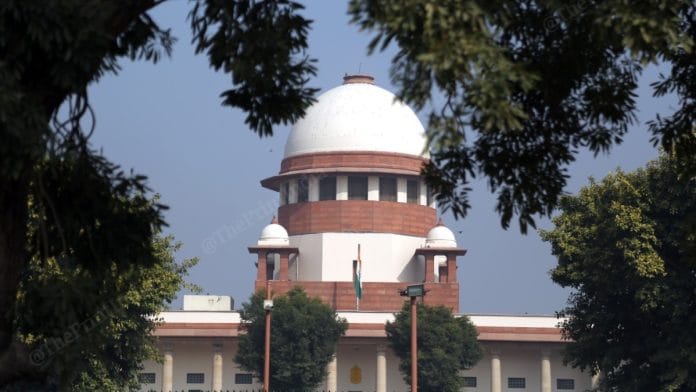New Delhi: Conversion to another religion must not just be a “meek claim”; rather, some positive act must be shown to evince it, the Supreme Court said Tuesday as it denied a Scheduled Caste certificate to a Christian-born woman who claimed to be Hindu while seeking reservation benefits for an upper division clerk job in Puducherry.
A bench of justices Pankaj Mithal and R. Mahadevan rejected the woman’s plea, which was made on the grounds that she professed and actively practised Christianity.
Her claim to be a Hindu by conversion, the court held, was merely to avail quota benefits and without any actual belief.
The judgment upheld the Madras High Court decision of January 2023 that gave a similar finding against the woman, who has been litigating since 2017.
The bench observed that “the conferment of Scheduled Caste communal status to the appellant, who is a Christian by religion, but claims to be still embracing Hinduism only for the purpose of availing reservation in employment, would go against the very object of reservation and would amount to fraud on the Constitution.”
In 2015, the petitioner, C. Selvarani, had applied for the post of upper division clerk, for which she took an examination as a Scheduled Caste candidate. Born to a Hindu father and Christian mother, Selvarani said her mother had embraced Hinduism. By virtue of her parents belonging to the Valluvan caste, she asserted herself to be a Scheduled Caste candidate.
During the course of certificate verification, however, the authorities asked Selvarani to produce the original latest community, residence and nativity certificates issued by the tehsildar.
Selvarani had earlier had a Scheduled Caste community certificate issued to her. But since she was asked to present the latest documents within a year’s time, which would satisfy the requirement of her being a Puducherry resident for a continuous period of five years prior to the date of application, she applied afresh for the caste certificate.
Based on a finding that she did not profess Hinduism, Buddhism and Sikhism, the tehsildar in March 2016 rejected Selvarani’s application. He concluded that a community certificate could not be issued to her.
Selvarani’s appeal against the order was rejected by the deputy collector, which she challenged before the Madras High Court. In March 2017, the HC directed authorities to conduct a fresh enquiry on Selvarani’s application. Three months later, her claim was rejected again on the same grounds as were mentioned in the earlier administrative order.
Before the HC, Selvarani argued that she belonged to the Valluvan caste and professed Hinduism as she had been going to Hindu temples and offering worship to Hindu deities. She claimed her mother started professing Hinduism after marriage and that both her father and brother also possessed the community certificate.
However, based on the evidence produced before it, the HC rejected Selvarani’s claim. The evidence included statements of villagers who affirmed that Selvarani’s father was a converted Christian and that her parents had married under the Christian faith.
Agreeing with the HC’s reasoning, the top court ruled that evidence clearly demonstrated that Selvarani professed Christianity and actively practised it by attending church regularly.
The apex court noted she was baptised when she was three months old and never took the step to get it cancelled. Even her parents’ marriage was registered with the church, it said.
“Despite the same, she claims to be a Hindu and seeks for Scheduled Caste community certificate for the purpose of employment. Such a dual claim made by her is untenable and she cannot continue to identify herself as a Hindu after baptism,” the top court bench observed.
Selvarani’s case, the court added, would go against the very object of reservation and would amount to fraud on the Constitution.
The bench accepted that there was no fixed ceremony for converting to Hinduism. Therefore, some positive act should be done to demonstrate it.
One such way, the court said, was by adopting a procedure prescribed through the Arya Samaj. Or, a public declaration to the effect of evincing conversion could also have been made, it said.
The bench referred to Article 25 of the Constitution, which enshrines citizens’ right to practise and profess their own faith, giving a secular identity to India.
However, the bench said: “One converts to a different religion, when he/she is genuinely inspired by its principles, tenets and spiritual thoughts.” But if the purpose of conversion is largely to derive the benefits of reservation but not with any actual belief in the other religion, the same cannot be permitted, as the extension of benefits of reservation to people with such ulterior motives will only defeat the social ethos of the policy of reservation, the court added.
With this observation, the court dismissed Selvarani’s contention that caste could eclipse upon conversion and would resume upon a reconversion. She made this argument to back her claim that her father had reconverted to Hinduism after marriage.
The court said that to prove the factum of reconversion, there must be more than a mere claim.
(Edited by Tikli Basu)
Also read: Baburnama citation, ‘centuries-old temple of Vishnu avatar’. Plea at centre of Sambhal mosque row






